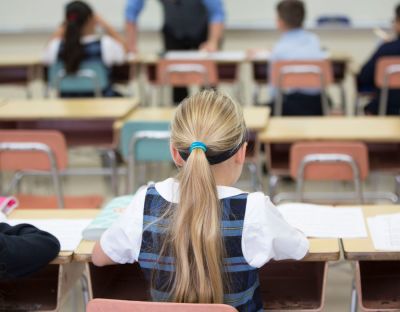Should Christian parents enroll kids in public schools?

As parents and grandparents across the nation are well aware, the 2024-25 school year is underway. This has led to renewed discussion of how Christians, and especially parents, should relate to public education.
A major article by Stefani McCade in the current issue of Christianity Today, “Public School Can Be a Training Ground for Faith,” has served to reignite a continuing debate — should Christian parents enroll their children in the nation’s public schools?
It is a fierce debate with parents on all sides making their case passionately. McCade illustrates the yin and yang of this debate. Kirk Cameron is quoted as describing Christian parents sending their children to public school as “subcontract[ing their] parenting and discipleship out to the government.”
Conversely, Jen Wilkin is cited in favor of public education both as a witness and as exposing children to “a more diverse socialization” and “a healthy exposure to different worldviews.”
In the interest of full disclosure, it should be noted that all my pre-collegiate education was conducted K-12 in the Houston Public Schools (1952-1965). Conversely, my children, born in 1974, 1977 and 1978 respectively, were educated in private schools entirely for their K-12 experience. In fact, my oldest daughter has an Ed.D., and my son and youngest daughter both have master’s degrees, and the only time any of the three of them attended a public school was when my son was on a football scholarship at the University of Texas.
Although my wife and I were both the products of public education (she attended a Christian school for ninth grade), we had made the decision in 1972 (before we had children) that we would make whatever financial sacrifices were necessary to make certain our children attended Christian schools.
We both agreed that if we had to make a choice, we would prefer our children to attend Christian schools instead of saving money for Christian colleges. As my wife puts it, “If I have to make a choice, I would rather my children face education hostile to the Christian faith when they’re 18 rather than 8!”
I am thankful to the Lord that He provided us with resources to finance our children’s education (often three tuitions at once). We had to budget and sacrifice, drive less luxurious and older cars, and take less expensive vacations. It was worth it. I am grateful to God to be able to say that all three of our children (now 50, 47, and 45) are happily married and active in their own local churches.
When my oldest daughter graduated from kindergarten at First Baptist Academy, Dallas the entire kindergarten class recited a Bible verse from memory for every letter of the alphabet and then concluded by singing, “I am a promise, I am a possibility, and I am waiting to see what God is going to make of me!” As soon as they finished singing, I turned to my wife and said, “that’s the best investment we have ever made!”
Clearly, I believe that the best place for a Christian child (and I would argue for non-Christian children as well) is a Christian school or home school. Why? I believe we have an obligation to disciple our children according to Christian beliefs and principles (Deut. 6). Our children are going to spend the majority of their waking hours for the majority of their formative years under the tutelage of their teachers. Who the teacher is and what they are teaching will make an enormous difference in their moral and spiritual development. This would seem to be self-evident.
I wanted my children to be taught the same biblical truths and spiritual values at school that they were being taught at home and at church. Such instruction would be inappropriate in a public school setting because that would violate the constitutional rights of non-Christians.
When people make the argument that our children need to be in the public schools as witnesses I am reminded of the "Children’s Crusade" of the early 13th century which purported to have Christian children go to the Holy Land and peacefully convert the Muslims. We don’t send children as missionaries to foreign lands and we shouldn’t send children or missionaries into what is often a hostile public school environment.
Some make the argument that children sent to Christian schools suffer from not being exposed to the multiethnic and diverse socioeconomic backgrounds present in America today. First, that is a simple-minded stereotype. In fact, when I lived in the greater Dallas area, my children attended more ethnically diverse Christian schools than the public schools in their area.
Furthermore, I would solve any problem in this area by increasing the availability of Christian education for ethnically diverse communities.
Many object that too many people cannot afford the financial burden of Christian school tuition or home schooling because the mother has to work, especially if she is a single mother. I believe every conservative Christian church in America should either be operating a Christian school or working in partnership with like-minded churches to jointly operate a Christian school.
Additionally, conservative Christian churches should be actively working to raise money to provide scholarships for students and parents who need it. Too many parents are unable to provide their children with Christian education because of financial difficulties.
Of course, when one speaks of “Christian” education and “public” education, one is engaging in loosely defined terms. Many Christian schools need to be far more Christian in their presuppositions and practices. Public schools vary widely in their educational philosophies and practices. Many Americans are fortunate enough to live in communities that have relatively benign public schools that do not actively subvert Judeo-Christian values. Even in such communities, the public schools will fall short of what a truly Christian school will provide (this must be the case in order not to trample individual parental rights).
I also believe we should have vouchers and tax credits that would allow parents to make the choice about what school is best for their children. In an ideal world with vouchers and tax credits, parents could send their children to the school of their choice, be it a Baptist, Buddhist, Catholic, or a Charles Darwin School.
Back in the 1950s and early 1960s, when my wife and I were attending public school, Christians could send their children to public schools with little concern that the schools would try to undermine their Judeo-Christian faith. Parents today, however, have to contend with the prospect that the public schools may very well be out to undermine their core values.
Lastly, even if we place our children in Christian schools, we have a responsibility to be involved in the public schools in our areas to make sure they are not emotionally or spiritually abusing children in our communities.
Several years ago I had an encounter with the superintendent of a large suburban school district. The superintendent had written an article titled, “The Religious Right: A Threat to Our Teachers, Our Students, and Our Schools.”
When I questioned some of the very questionable practices and curricula in his district, he inquired if I had students in his district’s schools. I replied that I did not and would not do so under their leadership. He then informed me that I was not in his district and that I had no business injecting myself into the district’s practices.
I responded by asking him if his district received any federal and state funding. He acknowledged that they did. I then said, “Well then, I am in your district. And, by the way, they are not your schools, your students, and your teachers. They are the public’s schools, students and teachers, and I am a part of the taxpaying public.”
I do believe public schools can be a great place for Christian teachers and Christian administrators, just not Christian students.
P.S. What profession has the highest percentage of its own children attending private schools? The answer is public school teachers and administrators. Do they know something we don’t?
Dr. Richard Land, BA (Princeton, magna cum laude); D.Phil. (Oxford); Th.M (New Orleans Seminary). Dr. Land served as President of Southern Evangelical Seminary from July 2013 until July 2021. Upon his retirement, he was honored as President Emeritus and he continues to serve as an Adjunct Professor of Theology & Ethics. Dr. Land previously served as President of the Southern Baptist Convention's Ethics & Religious Liberty Commission (1988-2013) where he was also honored as President Emeritus upon his retirement. Dr. Land has also served as an Executive Editor and columnist for The Christian Post since 2011.
Dr. Land explores many timely and critical topics in his daily radio feature, “Bringing Every Thought Captive,” and in his weekly column for CP.




























